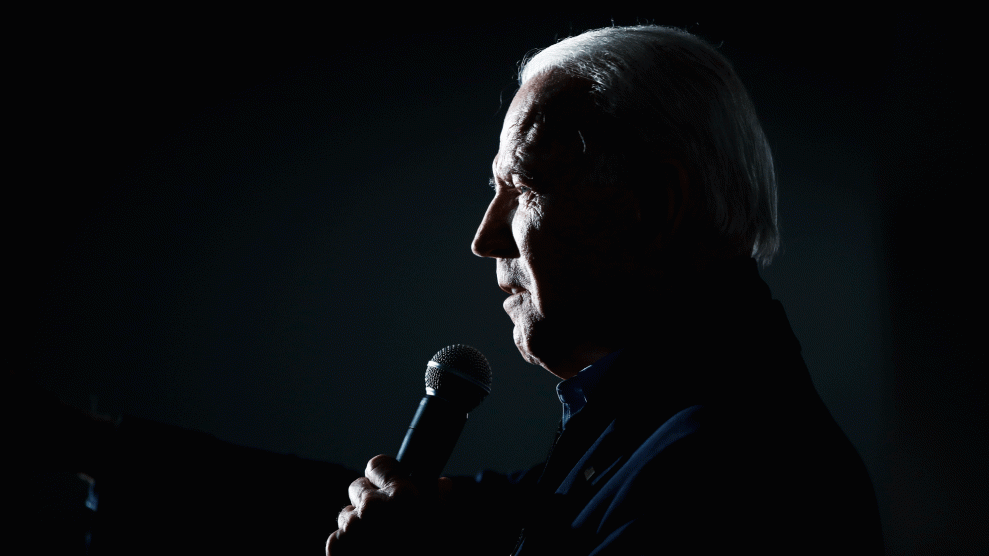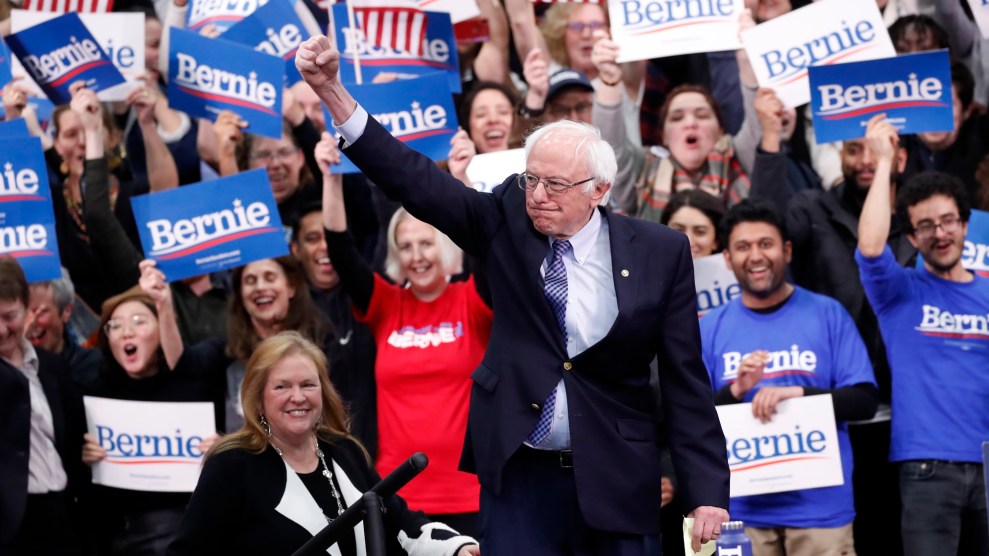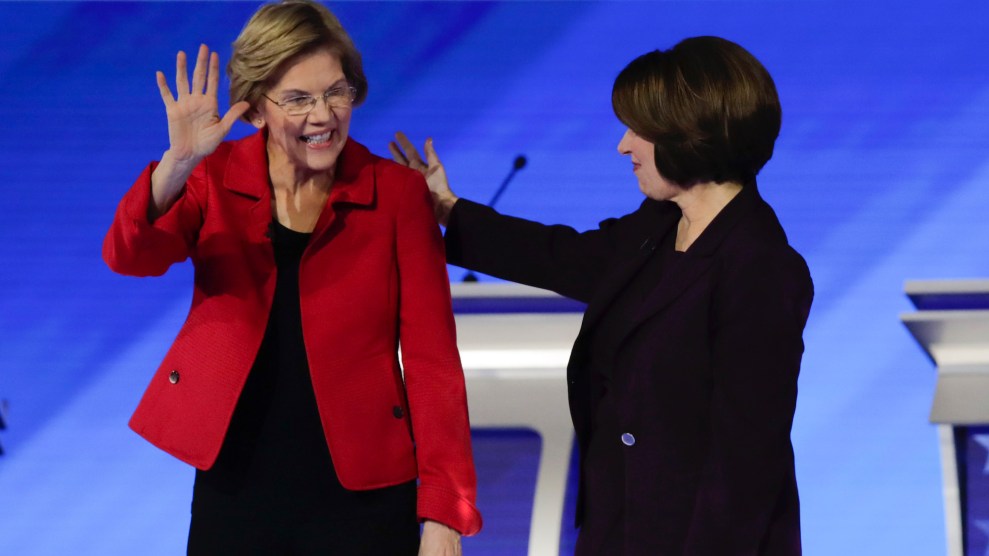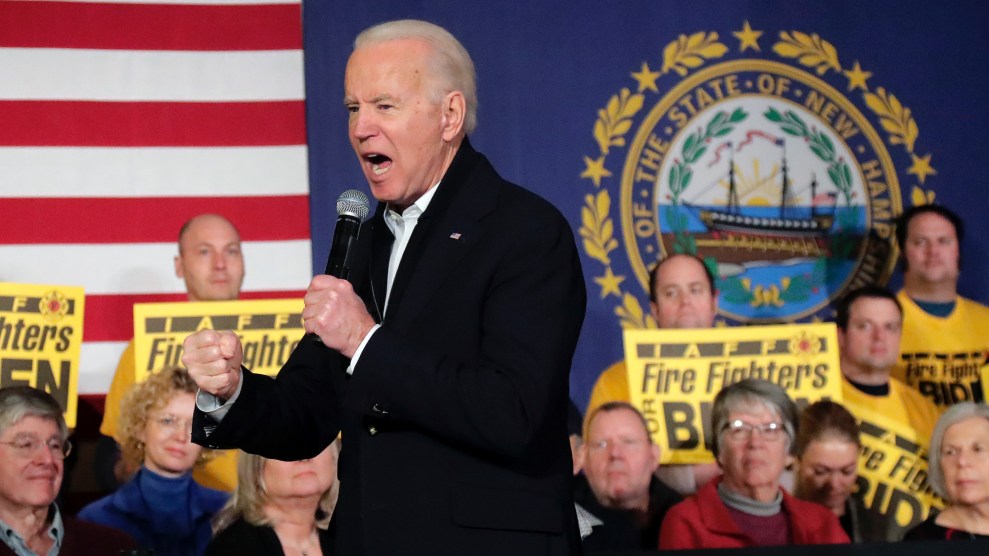
Matt Rourke/AP
It’s never a good sign when you’re addressing your New Hampshire supporters on primary night from South Carolina. Yet this was the position Joe Biden found himself in on Tuesday evening as his campaign sought to downplay his dismal showing in the Granite State, where he was on pace to finish 5th with a little over 8 percent of the vote. Once it had become clear that the outcome in New Hampshire would be nothing to celebrate, he and his wife Jill bailed on the campaign’s primary watch party at the Radisson Hotel in Nashua and jetted to Columbia to kick-off his South Carolina campaign.
Beaming into the Radisson’s half-full ballroom via video, Biden thanked his backers and pledged to return to New Hampshire as the Democratic nominee. He spoke for all of three minutes before vanishing from the screens positioned on either side of the stage to get back to the pressing task of salvaging his troubled campaign.
“I don’t blame him,” Biden bundler and DNC member William Owen said of the former vice president’s decision not to stick around New Hampshire. “He needs to be heading to Nevada.” Biden is headed there on Friday to campaign ahead of next week’s caucus. “Nevada’s the critical state. He has to score in Nevada.”
Owen added that he wasn’t surprised by Biden’s showing in the first-in-the-nation primary. “I kind of expected it. New Hampshire is unique. It’s basically an all white state. It’s dominated by the neighboring candidates,” he said, referring to Sens. Elizabeth Warren of Massachusetts and Bernie Sanders of Vermont. Sanders won the New Hampshire primary, with former South Bend mayor Pete Buttigieg trailing narrowly behind him.
Former New Hampshire governor John Lynch, a top Biden surrogate, echoed Owen’s sentiments: “It’s always hard running against elected officials from neighboring states.” He said he expected Biden to perform well in South Carolina. “The whole primary process, it’s a marathon, it’s not a sprint,” Lynch added, in what seems to have quickly become the mantra of the campaign. Addressing the Radisson crowd, Valerie Biden Owens, Biden’s sister, similarly assured supporters that “right now we’re at the very beginning of a long marathon.”
But Biden now has a sizable gap to close if he hopes to regain the frontrunner status he started the campaign with. And his campaign seems destined to confront ongoing questions about whether he can go the distance against President Trump.
Our reporters fanned out to victory parties for the top three Democratic finishers for this edition of the Mother Jones Podcast, “How Bernie Sanders Won New Hampshire.” Listen:
At campaign events in New Hampshire over the past week, numerous voters said they liked and admired the former vice president, but they seemed unsure about—or outright opposed to—betting on him in a high-stakes election they view as a referendum on the fate of the country. “I respect him, he’s a great American,” said Portsmouth neurosurgeon Henry Pallatroni, who was attending a Pete Buttigieg rally in Londonderry on Sunday. But he went on: “I wouldn’t vote for him. I think he’s done. I don’t think he’s up for the job.”
Heather Webster, a New Hampshire voter who was attending an Amy Klobuchar rally in Manchester on Sunday, said she initially favored Biden in the race but had begun to reconsider. “I feel like Biden doesn’t have as much an ability to beat Trump,” she said. “I was leaning towards him until Friday—I just didn’t feel good about his debate style.”
Biden did little to allay those concerns over the weekend. At the McIntyre-Shaheen dinner on Saturday, where thousands of local Democrats gathered to hear speeches from the candidates, Biden gave rambling and, at times, halting remarks filled with anecdotes that never seemed to land. The following day, he engaged in a bizarre back-and-forth at a campaign event in Hampton that culminated with him jokingly calling an audience-member a “lying, dog-faced pony soldier.” (Biden has said this was a line from a John Wayne movie, but even then…)
Still, vintage Biden did show up occasionally. Hours after his “pony soldier” comments went viral, he hosted an at-times emotional Q&A in Hudson, displaying his unique ability to connect with voters on a personal level. He referred to elderly audience members as “mom” and “dad,” and on two occasions offered to speak privately to attendees who asked questions following the event. (“Maybe you and I can talk afterwards.”) When one of his handlers called out “last question,” Biden spoke up: “No, we’ll take a few more.”
This was also the Biden who showed up to a rally in Somersworth last week, where some supporters expressed relief over seeing a feisty, fired-up Biden take shots at Sanders and, for the first time, Buttigieg. And just yesterday, he moved a packed community center in Gilford, when he spoke openly about his struggles with stuttering and welcomed a 12-year-old boy with similar difficulties to share the lectern with him, kissing the boy on the head with signature Biden affection.
These are the encounters that enrapture Biden crowds. But in the end these appearances failed to squelch doubts about whether he was the right candidate to take on Trump—the paramount concern of many voters agonizing over the issue of electability.
“I think Joe Biden on his worst day is better than Donald Trump could ever hope to be,” said Jim McGuire, a 72-year-old retired attorney from Nuangola, Pennsylvania, who had traveled to New Hampshire to assist with Biden’s get-out-the-vote effort and attended the candidate’s primary night party.
But he acknowledged he would like to see more energy out of Biden: “I need to see more fire in the belly. I’d like to see more of that passion.”
Biden’s supporters are hopeful that he will reclaim his momentum in the upcoming contests. “I think Joe will be fine if he comes in first or second in Nevada and rights the ship in South Carolina,” Owen said.
Lynch, referring to Buttigieg’s second place finish in New Hampshire, said voters in the state “tend to gravitate toward someone new. We’re ‘live free or die.’ We’re independent. We’re contrarian.”
He added, “New Hampshire always matters. But it’s just the start of the process. Not the end.”
Additional reporting by Russ Choma.










